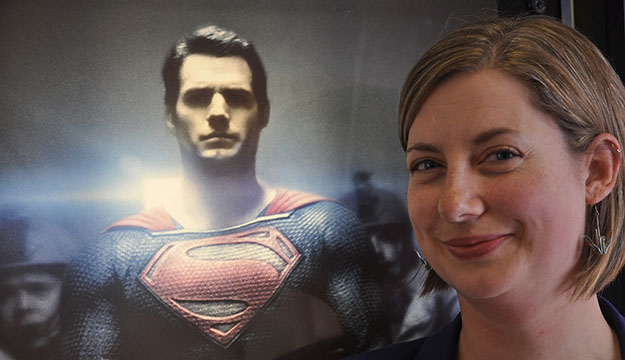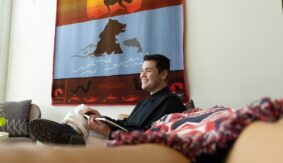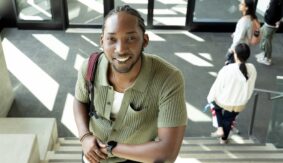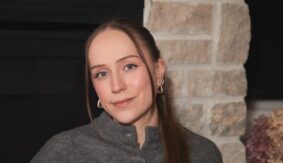
Christine Schreyer can finally disclose her secret identity. The linguist and anthropologist at UBC’s Okanagan campus served as a consultant for the hit Hollywood blockbuster Man of Steel, and helped producers develop an authentic new language for Superman’s doomed home planet of Krypton.
“They wanted to respect the canon, but come up with something new,” says Schreyer, who set about doing exactly that—after signing a confidentiality agreement in August 2011 that she would not reveal her Man of Steel role until after the movie’s opening week.
On the big screen, Schreyer’s Kryptonian symbols appear throughout Man of Steel, among crests on costumes, scripted onto weapons, emblazoned on the mysterious Codex and inscribed on bulkheads, and on the exterior of Kryptonian spaceships.
“Kryptonian has never been spoken in a movie—but now there is a created language,” says Schreyer, an assistant professor with the Irving K. Barber School of Arts and Sciences.
Schreyer has taught a course that examines constructed languages such as Star Trek’s Klingon and the Na’vi language devised for 2009 film Avatar.
The “S” stands for hope
Schreyer worked alongside graphic designer Kirsten Franson, who developed the Kryptonian script based on Schreyer’s suggestions, which were influenced from her knowledge of the Cree Syllabics writing system. Franson fine-tuned the glyphs and worked the symbols into the set and prop designs. Schreyer also created a vocabulary consisting of about 300 words.
McDowell says the idea of developing an entire new and specific language for the world of Krypton evolved from the beginning of production. It was determined that the symbol on Superman’s crest did not simply represent the letter “S” of English, so an imaginative approach was needed.
“Christine’s contribution to the design and meaning of Krypton in Man of Steel was crucial in a way that will not be fully understood by the audience, but without which we would have been missing a layer of meaning and legibility that in my view enriched the film immeasurably,” McDowell says.
“She also pulled together the anthropological logic of the language within our very constrained schedule, remarkably fast considering that the Na’vi language took more than two years to develop for Avatar.”
Linguistics goes Hollywood
Schreyer’s familiarity with Klingon and Na’vi provided a starting point for Man of Steel requirements since she knew a bit about how other linguists had created languages for movies.
“I kept it simple, to bring the words together,” says Schreyer, adopting a subject-object-verb grammar structure as opposed to English subject-verb-object construct.
She recorded Kryptonian sounds on a digital recorder and emailed files to the production team while on another research project in Whitehorse. Schreyer’s biggest challenge was keeping the project secret for two years. “I just wanted to tell everybody about the exciting project I was working on, but I was sworn to secrecy,” she says.
Schreyer is mildly disappointed there is no spoken Kryptonian in the film. However, she worked extensively on the viral marketing campaign for Man of Steel, including an online glyph creator where visitors can type in their name and see the Kryptonian spelling and symbol shield that identifies with the name.
Now that Schreyer has her Hollywood credentials? “The linguistic community in filmmaking is pretty small, and I am really thrilled to be part of it.”







